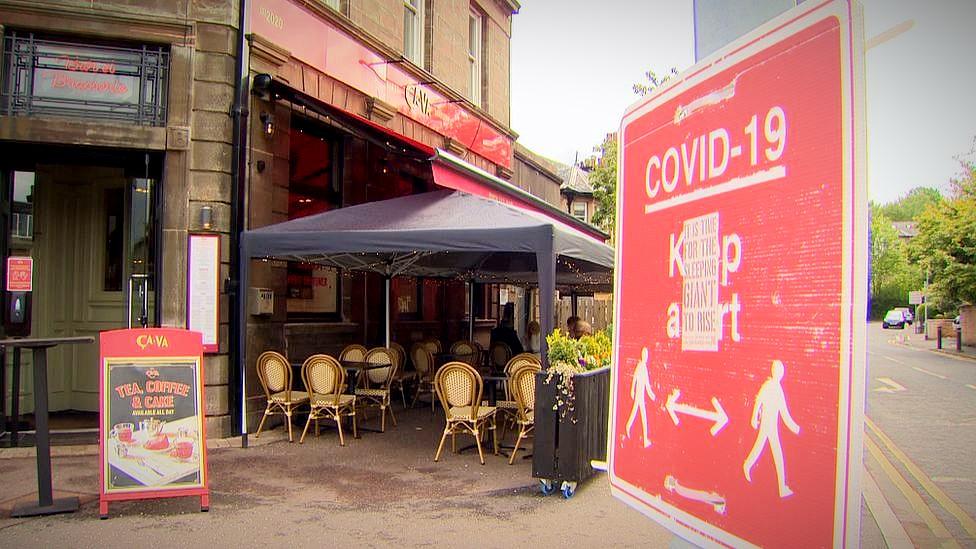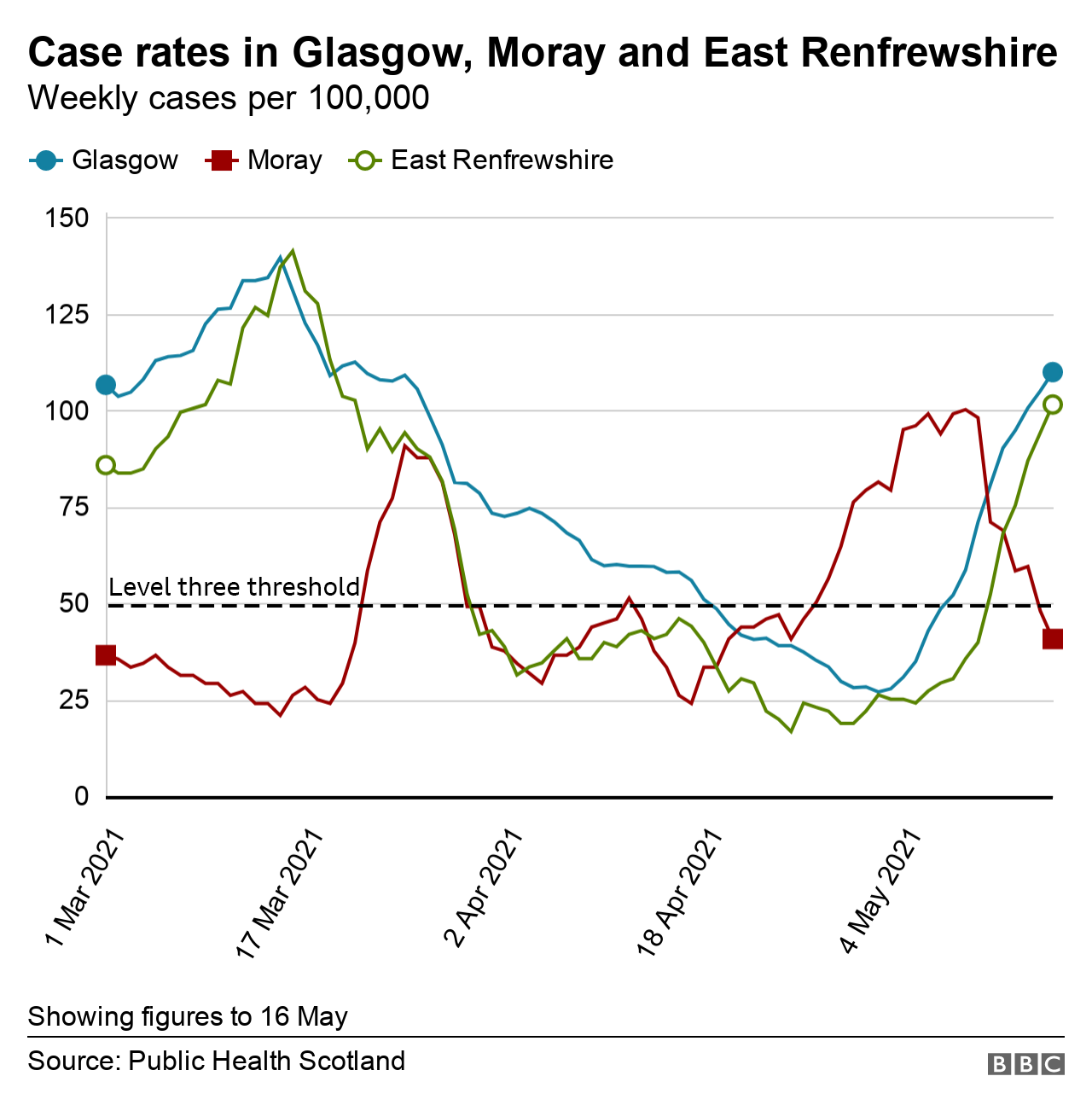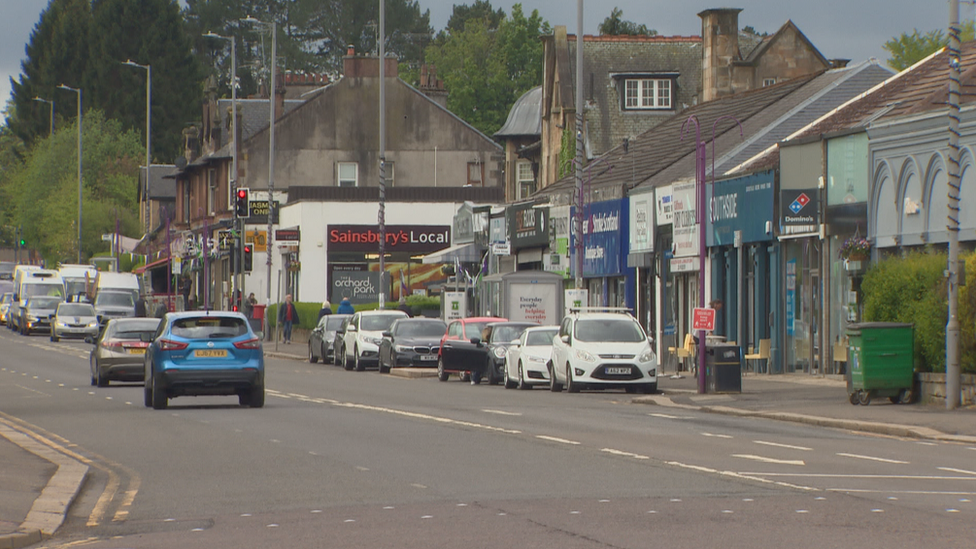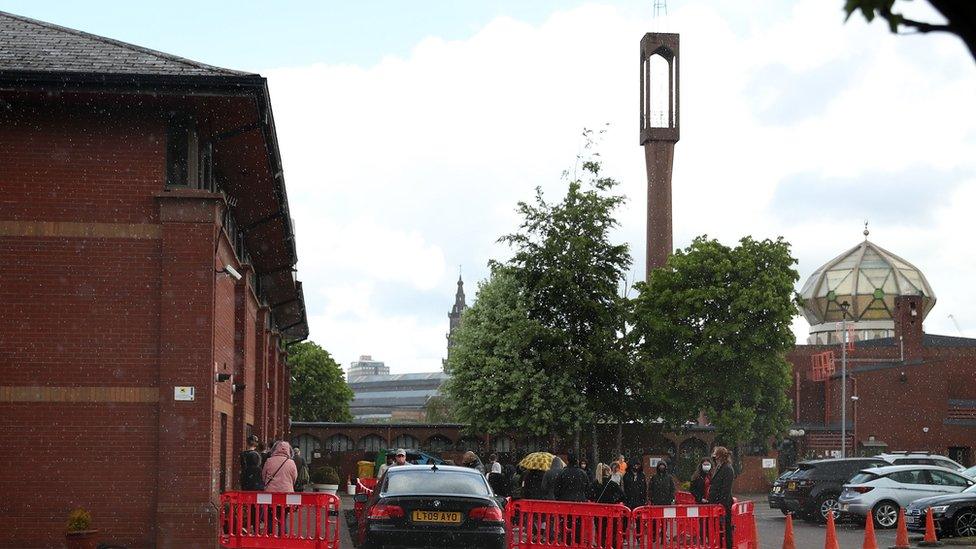Covid cases continue to rise in East Renfrewshire
- Published

East Renfrewshire moved into level two this week, allowing hospitality venues to serve alcohol inside until 22:30
Covid rates in East Renfrewshire have risen again, with the council area joining Glasgow with over 100 cases per 100,000 people.
The East Renfrewshire rate now sits at 101.5, while the Glasgow rate is at 109.9, official statistics show.
That rate is a key indicator of which restriction level an area should be in, with upwards of 50 cases per 100,000 seen as a threshold for level three.
Meanwhile three Glasgow high schools have asked senior pupils to stay home.
Glasgow and Moray are the only areas currently under level three Covid restrictions.
In Moray, the case rate has now dropped to 40.7 per 100,000, and appears to be on a downward trajectory.

The Scottish government is expected to review which levels areas should be in later this week.
The weekly case rate is one factor that will be considered, but others include the ability of the local NHS to cope.
Everywhere in Scotland apart from Moray and Glasgow dropped down to lower levels of restrictions on Monday, with the rest of the mainland and Skye at level two, and some islands now at level one.
Data from Public Health Scotland suggests that while the rate is still going up in Glasgow, the rise is slowing.
Provisional data, however, suggests it is picking up in East Renfrewshire and could overtake Glasgow when the next set of daily figures are published on Thursday afternoon.

The rate in East Renfrewshire, pictured, is now over 100 cases per 100,000 people
On Monday, East Renfrewshire - which is to the south of Glasgow - moved with most parts of Scotland into level two.
These restrictions allow pubs and restaurants serve alcohol inside until 22:30, and limited numbers of people to socialise indoors.
Social distancing during meetings indoors or in private gardens is no longer required in levels one and two.
Cinemas, theatres, concert halls, music venues, comedy clubs and bingo halls can have been allowed to reopen with restrictions.

Glasgow Central Mosque is being used as a vaccination centre
Glasgow's outbreak - which is suspected of being linked to the B1617.2 Indian variant - is focused in the south of the city, with Pollokshields recording the highest rates.
Three secondary schools in the southside have asked senior pupils to stay at home for three weeks from 24 May, unless they have assessments, to help reduce the spread of Covid.
The schools - Shawlands Academy, Holyrood Secondary and Bellahouston Academy - are all in the G41 and G42 postcodes which are current hotspots for the virus.
Glasgow Central Mosque is now operating 12 hours a day as a vaccination centre to inoculate younger adults in the area.
Those aged 18 to 39 who live in postcodes G41, G42, G5, G51 or G52 are being offered vaccines to tackle the outbreak.
Covid vaccinations are also being offered to those aged 18-39 in Moray.
Elsewhere, it is mainly those aged 40 and over who are being offered vaccine appointments - though younger people have been called in some areas.
A further two cases of the Indian variant of Covid-19 have been discovered in the Kirkcaldy area, according to NHS Fife. It brings the total number of cases associated with this variant in the region to eight.
Call for caution
Scotland's national clinical director Prof Jason Leitch said a contingency supply of vaccines was being used to vaccinate the younger age groups.
He told the BBC: "We've got to be slightly more cautious about that route because of supply.
"We simply do not have 60 million vaccines for every person in the country. We're getting them, they're coming, and by the end of July we will have offered every adult a single dose, let's be clear, but we can use some contingency vaccine for these hotspots Bolton, Glasgow, Moray, so we can do it."
Prof Leitch stressed that it would take three weeks for vaccines to offer protection and in the meantime it was important to focus on testing as well as precautions such as social distancing.
He added: "We're testing everything that moves, we're putting it through letter boxes, we're setting up testing clinics in mosques and community centres, so if you live in these areas where the numbers are rising, get tested, get the positive tests off the street, then we can get a hold of it and then Glasgow and the other areas can continue on the route map."
He said authorities were also trying to find people in Glasgow who did not come for their first dose, or who missed their second jab, to encourage them to get fully inoculated.
NHS Greater Glasgow and Clyde said it is finalising plans to bring forward second doses for those aged 50 and over in the affected areas of the city.